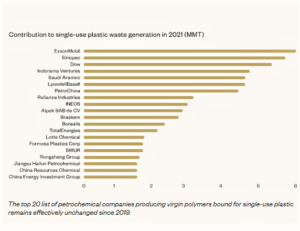Single-use plastic waste is at record levels, with hefty climate toll, report warns
By Dana Drugmand
From grocery store bags and soda bottles to take-out containers and food packaging, single-use, disposable plastic is a pervasive problem that presents not just waste management problems, but considerable harmful climate impacts as well, according to a new report.
Lifecycle greenhouse gas emissions associated with single-use plastic amounted to roughly 450 million metric tons of CO2 -equivalent in 2021, comparable to the total emissions of the United Kingdom, a new analysis has determined.
The Plastic Waste Makers Index released this week by the Australian-based Minderoo Foundation reports that there is more single-use plastic waste than ever – 139 million metric tons in 2021, an increase of 6 million metric tons from the 2019 amount – and that this fossil fuel-based plastic generated hundreds of millions of metric tons of climate pollution. Conventional recycling can help reduce these emissions, but recycling is not scaling fast enough and is expected to remain marginal, the report finds.
“This is a much needed, if devastating report. It demonstrates more clearly than ever how much single-use plastics blight our environment, and are themselves a key driver of climate change. And also that recycling is far, far behind where it needs to be,” Toby Gardner, senior research fellow at Stockholm Environment Institute and a contributor to the report, said in a statement.
The report updates a previous analysis of single-use plastic waste released by Minderoo Foundation in 2021, which identified for the first time the 20 largest petrochemical companies that are the sources for much of the world’s single-use plastic production. According to the new report, ExxonMobil leads the pack, followed by Chinese petrochemical giant Sinopec, and then Dow.
As the report explains, the majority of the emissions occur upstream during the production process, including fossil fuel extraction and refining of the petrochemical feedstocks that go into plastics.
Fossil fuels by another name
Plastics are essentially fossil fuels in another form. According to the report, 98% of single-use plastics come from fossil fuel feedstocks. It is no coincidence that ExxonMobil, one of the biggest fossil fuel producers in the world, also ranks as the world’s top producer of single-use plastic.
 “The latest Minderoo Foundation report is yet another example that the plastic pollution crisis is getting worse and the fossil fuel industry is responsible,” Graham Forbes, lead for Greenpeace USA’s Global Plastics Campaign. “Single-use plastic is harmful and contributes to climate change.”
“The latest Minderoo Foundation report is yet another example that the plastic pollution crisis is getting worse and the fossil fuel industry is responsible,” Graham Forbes, lead for Greenpeace USA’s Global Plastics Campaign. “Single-use plastic is harmful and contributes to climate change.”
Plastics’ contribution to the climate crisis has garnered increased attention in the last several years. A groundbreaking 2019 report – the first comprehensive cradle-to-grave analysis of plastics’ climate footprint – found that plastic emits greenhouse gases at each stage of its lifecycle, and estimated that plastic production and incineration would add over 850 million metric tons of greenhouse gases to the atmosphere in 2019 alone. In the United States, emissions from plastic production are expected to exceed emissions from coal-fired power plants by 2030, according to a 2021 report.
“Plastics is a climate change issue, no question,” Judith Enck, president of Beyond Plastics and a former EPA regional administrator, said during a recent media briefing on plastics and petrochemicals held in New Orleans, Louisiana.
Southern Louisiana is one of the epicenters of the U.S. petrochemical buildout and petrochemicals are projected to become a significant source of revenue growth for the oil and gas industry as demand for petroleum as a fuel wanes.
“Plastics is the Plan B for the fossil fuel industry,” Enck said.
Drowning in plastic
A key piece of that plan appears to be drowning consumers in single-use plastics, which is the largest and fastest-growing segment of the plastics industry.
“Single-use plastics are at the center of this new business strategy to increasingly profit from petrochemicals,” said Philip Landrigan, director of the Global Public Health Program at Boston College, in a January webinar on the topic of plastics’ impacts on human health. Plastics, including single-use, contain thousands of chemical additives, many of which are highly toxic and act as carcinogens, neurotoxins, and endocrine disruptors, and “cause disease and death at every stage of their life cycle,” according to Landrigan.
Reducing plastic production and consumption is critical for protecting human and planetary health, experts say.
“If we are truly serious about fighting plastic pollution and the climate crisis, governments must commit to negotiating a strong global plastics treaty that will deliver major reductions in plastic production, keep oil and gas in the ground, end single-use plastics, hold big polluters like Exxon accountable for putting profits over people, and build refill and reuse systems. Otherwise, we are just chasing after a runaway catastrophe that is already having devastating impacts on our health, our climate, and our communities,” Forbes said in an email.
Andrew Forrest, chairman of the Minderoo Foundation, said the new Plastic Waste Makers Index report shows that the industry cannot be counted on to fix the problem on its own.
“The fossil-fuel giants aren’t tackling the problem of plastics – it’s the opposite, they’re making even more of a product that threatens our people and planet. For the petrochemical industry to argue otherwise is greenwashing of the highest order,” he said. “We need a fundamentally different approach that turns the tap off on new plastic production.”
 EWG
EWG


